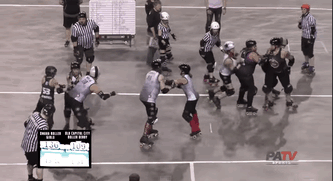A few years into derby, my league was doing pretty well, and I felt like I had really come in to my own as a skater and a jammer. I had some struggles, and wasn't a top performer, but I enjoyed skating fast and juking blockers. It was games like our hard loss to the Mid Iowa Rollers in 2010, and an eye-opening fight against Minnesota the next year, that I realized how far I really had to go to stay on top in this sport.
As a jammer, not getting out first and achieving lead jammer status can be an instant mental road block. Falling down, getting ran back by a tricky blocker, or fighting an impenetrable wall can begin to feel like drowning. Not only are you likely to not score points, but the other jammer has control of the jam and how long it will last. Now that the mental blinders are on, vision does really become tunneled, which adds to the difficulty of getting out of the pack. The pressure builds, emotions start to take over, and your mental "I can't" becomes reality.
I don't really know what specifically changed over time, probably just getting more experience on the track and playing a wider range of teams added to it, but bout day became a little less scary. When we came against MIR again in 2012, their game had grown immensely, and I knew it was going to be hard. Going into it I decided to let go of any negative thoughts as they happened, and to not get anxious when things didn't go my way. That choice helped me turn my game around from a 0 point half, to score 39 points in the second. After that, a few humbling years of playing higher ranked teams and losing a lot may have hurt my derby soul a bit, but ultimately I came out of it all a bit tougher. Our most recent game against Omaha was a little rough, but I felt like it was one of my most focused games ever.
In the star, you have to start against one other person on the jam line, with eight people ahead of you which you have to fight through once before you can even start scoring. How to attack the pack is intimidating, but I had multiple plans that I had visualized many times in my mind. I knew that Ima Firestarter likes to attack on the line, and I know my teammates well enough to help me get started. I was prepared which took away part of the nerves.

Besides blockers, penalties are another enemy of the jammer. Penalties can be pretty inevitable in Roller Derby, but getting them as a jammer means being responsible for your team not scoring for 30 whole seconds. It sucks, and you really feel like you let your team down when it happens. The thing to remember though, is that your one or two bad jams or penalties are not the whole game. There are 13 other people on that roster, and about thirty-some other jams that make up 60 minutes. So as a jammer you have to make tough decisions. Do I need to slow down when I enter the pack so I don't chance back blocking, or use my speed to get through? Am I sure that blocker went out so I can hop back on the track, or should I just go back in behind everyone? They are split second choices that can have a big impact on the game.

In Omaha, I was knocked out of bounds but certain that I was safe to return back in bounds, but instead received a track cut. On average, I am a fairly clean jammer, but in this bout I had three penalties. I usually keep it safe, but as skill and knowledge of the game increases, you must make choices that may end up being risky. Instead of crying all the way to the box and pouting for 30 seconds, I try to force myself to watch what's happening and think about my next plan of attack. I can't worry about what has already happen, but must focus on what's next.
We didn't win,but I felt like I learned a lot during this game. 60 minutes boils down to lots of quick decisions. Deciding how to get through the pack, deciding to throw away anger at a referee call, deciding if it's time to call off the jam, deciding not to bitch about a nasty clockwise hit. Making those decisions and then OWNING them. You cut the track? Fine, what's next? Every game is a learning experience and dwelling on past mistakes is not going to move you forward. Acknowledge them, and decide what to do next time.
 |
| Photo by Danforth Johnson |

